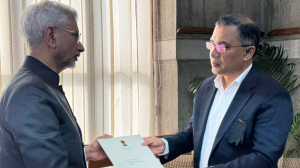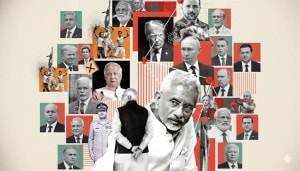Stop eating enriched grass
Most people -- this writer included -- live in the dread of man-made scourges like nuclear weapons and algebra. And when the two somehow see...

Most people 8212; this writer included 8212; live in the dread of man-made scourges like nuclear weapons and algebra. And when the two somehow seem to be ganging up on you it raises visions of a boosted fission apocalypse. You must therefore fight it with all your might, even if it means eating grass.
Any equation in a nuclearised scenario that reads NPT plus CTBT plus FMCT and so on can only spell disaster, or so the Indian mind has been persuaded to believe, somewhat understandably, during the years preceding Pokharan-II, and most stupidly in its aftermath. As the Vajpayee government took its time traversing the diplomatic distance from offering to adhere to some provisions of the CTBT to a voluntary moratorium on tests, sundry politicians and anti-NPT fundamentalists have had a field day demonising the international disarmament/non-proliferation regime represented by these treaties.
In the initial euphoria and probably because the key decision-makers had not quite thought this whole thing through as well asthey should have, the need to explain the altered post-May realities to the nation was forgotten. What was discriminatory to a non-nuclear or a threshold nuclear state until the other day became something quite different to the new India. But we were so shortsighted, so euphoric, we were celebrating our nuclear status and yet shouting the same old universal disarmament slogans.
For far too long, almost two weeks, we did not pause to absorb the new reality. That we too were now one of the nuclear weapons states. That if the nuclear rhetoric of our past was underpinned by the P-5 being the bad guys it was now particularly silly to go on with it when we were claiming to be the sixth member of the same now hallowed club.
The Left was the first opposition group to seize this opportunity by jumping on the quot;CTBT is surrenderquot; bandwagon. The Congress is still in two minds but, not taking any chances, the Vajpayee government is now trying desperately to correct this dangerous drift in public opinion, and youwonder if it isn8217;t already too late. The Prime Minister8217;s statement on Monday that India was now willing to negotiate with key interlocutors read P-5 to make the self-imposed moratorium on testing a quot;binding commitmentquot; is a part of this repairwork. But Vajpayee and other genuinely concerned people within the establishment have to deal with a problem that goes deep into the Indian psyche.z
Eating grass, or crumbs, somehow has become so essential to our masochistic, self-pitying worldview that today it is difficult to convince the urban middle class that with sensible politics and smart diplomacy you can have your bomb without needing to regress in the North Korean or Libyan manner of isolationism. But these slogans, quot;Hum ghaas khayenge8230;quot; or quot;Rukhi-sukhi khayenge, atom bomb banayengequot; We shall eat grass or crumbs, but make the bomb, are so deeply ingrained in the popular nuclear discourse that somehow the middle classes feel that having the bomb is only half the objective. We are yet to take on theworld, survive isolation, eat grass. We still seem to prefer martyrdom to victory. One Hindi newspaper has even launched a fund to fight the sanctions.
It is another typically subcontinental irony that the grass metaphor was originally the contribution of Zulfiqar Ali Bhutto. But in the days he gave his fellow Pakistanis the quot;we shall eat grassquot; call, his idea was not so much to promote collective vegetarianism as to persuade the richer Islamic countries, then flush after the oil price boom, to subsidise his kebabs, kormas and Black Dog whisky while he diverted his state funds towards the Islamic bomb. The slogan8217;s pan-subcontinental appeal was so markedly evident in the excited voices of the scores of people the TV channels interviewed across India over the past fortnight.
Why do we Indians have the habit of whining just when we should have been savouring a remarkable achievement? The US reaction so far has been a lot milder than you would have expected and the G-88217;s is a pleasant surprise. Even Clintonhad to lace his admonitions with fulsome praise. But for the stunning series of self-goals scored on the Chinese front, we could have ended up with an even better score. The Islamic world has been remarkably quiet. We not only have the bomb, but apparently the entire spectrum of products in the nuke supermarket, from the 200-kiloton thermonuclear city-busters to 0.2-kiloton weenies that could nevertheless vaporise an armoured regiment. We have almost got away with it. And yet we nurse this sense of slight persecution. The world is against us, the big powers are victimising us. The same old story.
So long have we chanted this mantra that we can8217;t stop even when we have filled out the application for big-power status. Our scientists have conducted such flawless tests, we say, and yet they won8217;t accept us as a member of the nuclear club. Who are they? Is the nuclear club like the Delhi Gymkhana, where you have to make an application and then a committee sits and figures out if you have the credentials? It isan entirely different matter, though you might have a better chance getting into the nuclear club than into the Delhi Gym.
Equally touching is the mood of self-congratulation within the foreign service at the quot;endorsementquot; of the Indian stand by the non-aligned nations and the rest of the Third World. Only to a self-pitying, inferiorly-complexed Indian mind steeped in Nehruvian hypocrisy would a Third World bomb sound like a sexy new idea. Poor nations acquire nukes to find a short cut out of the Third World. At least that8217;s what we have been told over the decades by the pro-bomb lobby. Here we want to use ours to confirm our status as the leader of the world8217;s wretched.
Unless this changes it will be impossible for this or any government to leverage May 11 and 13. The challenge before our diplomacy is to create conditions in which we get to keep our nukes at minimum economic cost. We must also negotiate for the lifting of the technology export controls imposed in 1974. Our only bargaining chip is thesigning of the CTBT, after the due process of haggling. The world, even Washington, would settle for just that. Nobody, not even China, is demanding that India dump its nukes now. The one thing the BJP leadership owes its diplomatic pointmen is an assurance that they would be able to sell it to the domestic constituency as a natural step in India8217;s progression towards genuine nuclear and world power status, and not a surrender.
- 01
- 02
- 03
- 04
- 05































